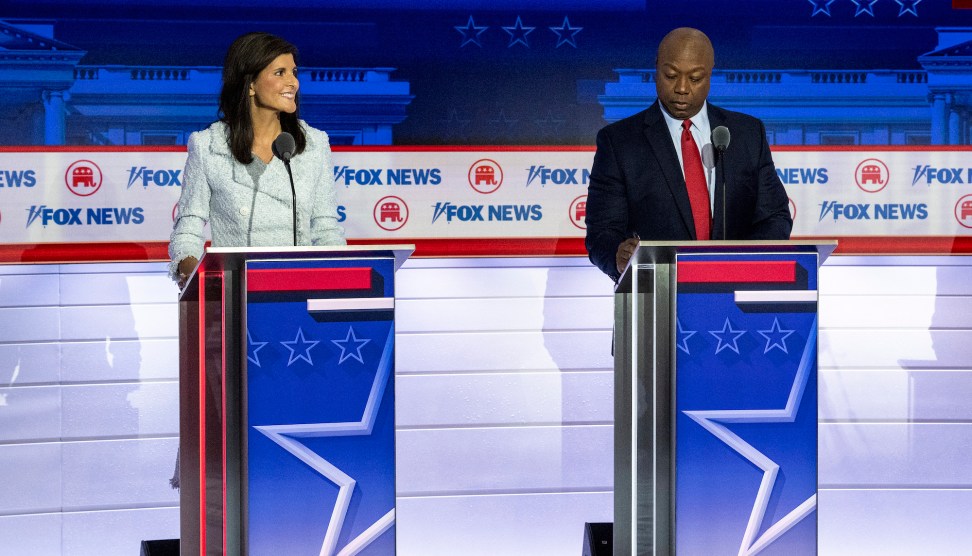
Former South Carolina Gov. Nikki Haley and Sen. Tim Scott on stage during the first Republican presidential primary debate last month.Christopher Dilts/AP
This weekend, Neil Cavuto of Fox News asked former South Carolina Gov. Nikki Haley what should have been an easy question about the ongoing UAW strike. Donald Trump had already made it clear how to respond from the right: Say something vaguely supportive about autoworkers, then pivot to claiming the Biden administration will send all their jobs to China by pushing electric vehicles. Instead, Haley portrayed workers in the largest industry in Michigan—a key battleground state that Trump won in 2016—as greedy and ungrateful.
“It tells you that when you have the most pro-union president and he touts that he is emboldening the unions, this is what you get,” Haley replied. “The union is asking for a 40 percent raise; the companies have come back with a 20 percent raise. I think any of the taxpayers would love to have a 20 percent raise and think that’s great.”
Ford, GM, and Stellantis’ offer to increase pay by about 20 percent is less impressive after taking into account that it would happen over four years. The proposal comes after the Big Three made roughly $250 billion in profits over the past decade, increased CEO pay by 40 percent, and booked an additional $21 billion of profit in the first half of this year. Inflation has eroded wage gains UAW members made in their last contract, but the companies have refused to restore the cost-of-living adjustments that workers gave up to help the Big Three survive bankruptcy and the Great Recession. The taxpayers who make Ford’s vehicles would likely envy the 1 percent effective federal income tax rate the company paid in 2021.
Haley, who as governor in 2014 said she didn’t want unions in South Carolina because “we don’t want to taint the water,” didn’t stop there. “I was a union buster,” she told Cavuto. “I didn’t want to bring in companies that were unionized simply because I didn’t want to have that change the environment in our state. We very much watched out for workers, but the way that we watched out for workers was we didn’t encourage middlemen between companies and their workers.”
Cavuto found himself in the unusual position of having to push back against a Fox News guest for being too anti-labor. “It’s very tough language governor,” he said, stuttering as he tried to process what he’d just heard. “I’m just wondering how union workers who are hearing you now might feel about that.” He reminded Haley that Ronald Reagan had done well with union members.
The original “Reagan Democrats” were in Macomb County, Michigan. Many of them were autoworkers. In 2016, Trump flipped Macomb—defeating Hillary Clinton by nearly 50,000 votes four years after Barack Obama carried the county by more than 15,000 votes. Without Macomb, Clinton would have won the state. In 2020, exit polls showed 40 percent of people in union households voting for Trump. For context, 41 percent of self-identified independents—a group no politician goes out of their way to insult—backed the former president. Trump knows what he’s doing by traveling to Michigan next week to speak to current and former union members.
More impressively, Haley has managed to be only the second-most anti-union presidential candidate from South Carolina. At a campaign event on Monday, Sen. Tim Scott got his own question about the strike. “I think Ronald Reagan gave us a great example when federal employees decided they were going to strike,” Scott explained in an apparent reference to the 1981 strike by air traffic controllers. “He said, ‘You strike, you’re fired.’ Simple concept to me. To the extent that we can use that once again, absolutely.” (Reagan fired more than 11,000 members of the Professional Air Traffic Controllers Organization, even though he’d vowed to help them while successfully seeking their union’s endorsement during the 1980 campaign.)
Tim Scott on UAW strike:
“I think Ronald Reagan gave us a great example when federal employees decided they were gonna strike. You strike, you're fired. Simple concept to me.”
pic.twitter.com/ke4hzSOTnp— Citizen Free Press (@CitizenFreePres) September 19, 2023
It is illegal to fire private-sector workers who are exercising their labor rights by going on strike. Nevertheless, it is helpful to know that Scott believes they should be fired. Not surprisingly, given the posture of its current and former elected officials, South Carolina has the lowest unionization rate in the country at 1.7 percent. That rate is about a sixth of the national average and well below other states in the South. As Haley can attest, union busting often works.
Trump’s speech in Detroit will happen at the same time as the second GOP debate. It sets up the possibility that Trump will be proclaiming his hollow support for striking autoworkers at the same time his distant rivals are boasting about being union busters. Appropriately enough, as Trump speaks in Detroit, the rest of the field will be assembled in California at the Ronald Reagan Presidential Library.













